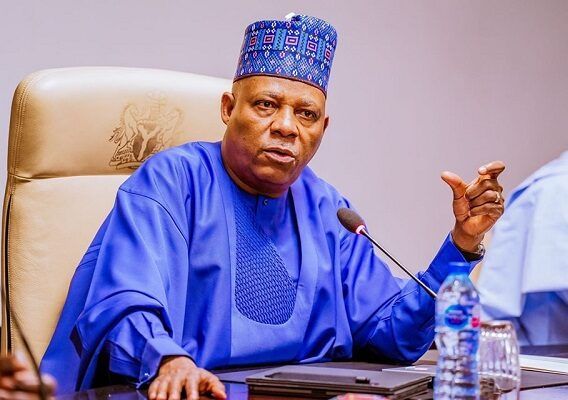At the 31st Nigerian Economic Summit Group (NESG), Vice President Kashim Shettima stood before an audience of policymakers, industry leaders, and diplomats to deliver a message of resolve, a message that Nigeria’s road to prosperity is not by chance, but by choice, shaped by bold reforms and shared responsibility.
The hall brimmed with anticipation as Shettima acknowledged a distinguished audience: members of the Federal Executive Council, special advisers to the President, the Emir of Kano, His Royal Highness Alhaji Dr. Muhammad Sanusi II, NESG Chairman Mr. Olaniyi Yusuf, members of the diplomatic corps, captains of industry, and representatives of the press.
With calm authority, the Vice President set the tone. Nigeria’s economic revival, he said, is anchored on a delicate balance between economic logic and public expectation. “There is no single decision we have taken that has not been guided by this pursuit of balance,” he noted.
Shettima emphasized that every reform introduced by the Tinubu administration is the product of deep reflection and courage, guided not by politics but by purpose. “We owe our specialists and stakeholders a debt of gratitude for standing with us through turbulent times,” he said, acknowledging the economists and policy experts who have shaped the nation’s reform agenda.
The Vice President affirmed that despite divergent opinions, Nigeria’s leadership remains united by one destination, progress. “Our task,” he declared, “is to stay the course and continue implementing the changes that will define the Nigeria of tomorrow.”
Shettima’s address was rich in data, evidence, he said, of reforms that are beginning to bear fruit. The Nigerian economy, he announced, had grown from $309.5 billion in 2023 to $372.8 billion in 2024. Revenue collection rose to ₦27.8 trillion by August 2025, exceeding the target of ₦18.32 trillion.
Debt service-to-revenue ratio, a key fiscal metric, has improved dramatically from 97 percent to less than 50 percent. International confidence has followed, with Fitch Ratings and Moody’s both upgrading Nigeria’s outlook to stable.
“Our GDP growth rate of 4.23 percent in September 2025 surpassed projections by global agencies,” Shettima added, highlighting a 411 percent rise in non-oil revenue and a tax-to-GDP ratio now at 13.5 percent, almost double what it was a few years ago.
“These numbers tell the story of a nation prepared for the present and ready for the future,” he said with conviction.
Reaffirming the administration’s federalist principles, Shettima stressed that the success of a federation lies in empowering its federating units. The government, he revealed, has increased monthly allocations to states, enabling them to pursue local development and fund critical projects.
Simultaneously, industrial productivity has risen, with oil production averaging 1.8 million barrels per day, and a goal of 2 million barrels by year-end. Foreign exchange stability, he explained, is the result of deliberate and coordinated policy, not coincidence.
“Our progress rests on the sacrifices of Nigerians,” he said. “To them, I say: the better days we promised are already within sight.”
Shettima identified agriculture and solid minerals as twin pillars of Nigeria’s diversification strategy. The government has launched partnerships with foreign nations to modernize farming practices, expand extension services, and empower local farmers through intermediate technologies that sustain livelihoods.
The solid minerals sector, he noted, generated ₦12.58 billion in 2024, signaling renewed growth through deliberate reforms. “This is a sign of the sector’s awakening,” he declared.
In parallel, micro, small, and medium enterprises are receiving a boost through a ₦200 billion intervention fund and access to grants, loans, and equity investments of up to $100,000. These initiatives, he said, reflect the government’s people-centered economic vision.
Shettima underscored landmark fiscal reforms, including the passage of the Tax Reform Act, the Nigeria Tax Administration Act, and the Nigeria Revenue Service Establishment Act. These measures, he explained, will streamline taxation, protect low-income earners, and boost domestic revenue generation.
Infrastructure remains another pillar of progress, with over 440 road projects spanning 2,700 kilometers currently underway. “These investments are the arteries of national prosperity,” Shettima said.
Unveiling the Renewed Hope Ward-Based Development Programme, the Vice President described it as a bottom-up approach to development modeled after successful frameworks in China, India, and Kenya. The initiative targets all 8,809 wards across 774 local governments, mapping local economies and empowering communities.
“It ensures no Nigerian is left behind,” he affirmed, urging state governments to align with the national vision for inclusive growth.
In a passionate appeal, Shettima called for renewed patriotism and cooperation between labour and the private sector, particularly regarding the Dangote Refinery, which he described as a symbol of national pride and economic resilience.
“Aliko Dangote is not just an individual; he is an institution,” Shettima stated. “If he had invested $10 billion abroad, he might be worth $80 billion today. But he chose to invest in Nigeria. How we treat him will determine how the world judges us.”
He urged dialogue over discord, stressing that Nigeria is greater than any union or individual interest.
As the summit drew to a close, the Vice President reminded participants that the government is ready to act on the recommendations emerging from the NESG deliberations.
“We are not condemned to low growth, high costs, and low trust,” he said. “We will stabilize, industrialize, and humanize our economy. We will build a Nigeria where every citizen feels respected and served.”
With that, Vice President Kashim Shettima, on behalf of President Bola Ahmed Tinubu, officially declared the 31st Nigerian Economic Summit open, reaffirming that Nigeria’s journey toward prosperity, though challenging, is already well underway.










